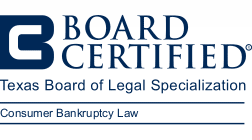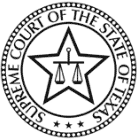Bankruptcy FAQs
WILL BANKRUPTCY STOP ALL THE HARASSING PHONE CALLS AND MAIL FROM BILL COLLECTORS?
Yes. Once you retain our law firm, a contract will be signed allowing us to accept your creditor calls so that you may refer them to us. Furthermore, as soon as your case is filed, an automatic stay will go into effect which will stop all creditor activity, including calling you.
WILL BANKRUPTCY STOP A WAGE OR BANK GARNISHMENT FROM THE IRS OR A LAWSUIT?
Yes. The automatic stay will stop garnishments in most instances.
CAN FILING BANKRUPTCY STOP FORECLOSURE?
Generally speaking, yes. However, there are exceptions. If you qualify, filing for Chapter 13 allows you to reorganize your debt and repay your mortgage arrears over time, thereby stopping the foreclosure. The automatic stay stops all collection activity immediately when your case is filed. However, if you have filed for bankruptcy multiple times, you may not be entitled to the automatic stay without first seeking approval from the court. Chapter 7 may temporarily stop foreclosure, but it will not protect you from foreclosure in the long term if you do not immediately become current on your mortgage.
CAN FILING BANKRUPTCY STOP REPOSSESSIONS?
Yes, the automatic stay will stop creditors from repossessing collateral. If you qualify, the debt can be reorganized through Chapter 13. Similar to foreclosures, Chapter 7 may temporarily stop repossession but will not offer long-term protection.
CAN FILING BANKRUPTCY HELP WITH IRS TAXES?
Yes, but this is a very complicated area of the law. It is highly recommended you review your particular circumstances with an experienced attorney.
WHAT IS CHAPTER 11 BANKRUPTCY USED FOR?
Businesses often use Chapter 11 bankruptcy as a means to stay afloat by reorganizing and restructuring debt. This type of bankruptcy is rarely used by consumers, since it is far more challenging and complex than Chapter 13. However, individuals who do not qualify for Chapter 13 due to the debt limits may file for Chapter 11.
During Chapter 11, the business can address debts through restructuring, including modifying debts under leases and contracts. The business can usually continue operating in the midst of Chapter 11 proceedings while under court supervision.
DO I GET TO KEEP MY ASSETS IN A CHAPTER 7 BANKRUPTCY?
When you file for bankruptcy relief under Chapter 7 (liquidation), a bankruptcy trustee is appointed to administer your non-exempt assets. If you have non-exempt assets, the trustee can sell them and pay your creditors. However, this does not mean you cannot keep assets. Under the bankruptcy code and Texas law, certain assets are exempt, meaning they are yours to keep unaffected. Which exemptions to use and how they are applied is critical to the completion of a bankruptcy. It is best to consult with an attorney to know your rights, but in general, ertain amounts of equity in your homestead, vehicles, personal assets, and retirement plans are often exempt. The majority of people who file for Chapter 7 do not have non-exempt property to liquidate.
WHAT DOES "SECURED" OR "UNSECURED" DEBT MEAN?
Secured debt is debt that is secured by collateral (e.g. homes, real estate property, cars, appliances, or furniture), which can be taken if you do not pay the underlying debt. Unsecured debt is held by creditors that have no collateral securing the debt (e.g. credit cards, medical bills, personal loans).
WHAT HAPPENS WHEN ONE SPOUSE FILES FOR BANKRUPTCY WITHOUT THE OTHER SPOUSE?
It is possible for only one spouse to file an individual bankruptcy without the other spouse. However, you need to discuss this carefully with your attorney. The spouse that does not file may end up being responsible for some of the debts. The non-filing spouse's property may be at risk. Also, the non-filing spouse may need to provide financial information.
WHAT IF MY EX-SPOUSE FILED FOR BANKRUPTCY?
If your ex-spouse filed for bankruptcy, it is wise for you to immediately consult with an attorney. This is because even if your ex-spouse agreed to be responsible for debt in your divorce decree, this is not binding on your creditors. It is important to consult with an attorney so you know what your rights are.
CAN I BE HELD RESPONSIBLE FOR A DEBT THAT I CO-SIGNED?
Yes. You can be held responsible for any debt that you signed and agreed that you would pay in the event that someone else failed to make the payments (co-signed).
CAN ALL DEBTS BE DISCHARGED?
No. There are certain debts like student loans, government loans, back taxes, child support, and other debts that cannot be discharged. Some taxes can be discharged or reorganized in a Chapter 13 bankruptcy. It is important to discuss any delinquent taxes or child support with a bankruptcy attorney.
WILL I LOSE MY SOCIAL SECURITY PAYMENTS IF I FILE?
No. Social security payments are protected.
CAN I PICK WHICH DEBTS TO PUT IN THE BANKRUPTCY?
No. You must include all of your debts. However, some debts may be reaffirmed if you and the creditor agree.
DO I HAVE TO LIST ALL OF MY ASSETS?
Yes. It is important that you list all assets for several reasons. First of all, you must list all of your assets pursuant to the bankruptcy code. It is important that you disclose your assets to your attorney so he or she may properly advise you and help you protect them. Some things which may not seem like assets to you may be, which is why it is important to carefully answer all of the attorney's questions. It is a crime not to disclose all of your assets. By failing to disclose assets, you risk losing your discharge or facing prosecution for bankruptcy crimes.
DO I HAVE TO GO TO COURT?
Yes. In a typical Chapter 7 bankrupcty you will need to go to one hearing, which is called your 341 meeting of creditors. This is usually within 40 days of filing your case. Ms. Fealy or one of her associates will attend the hearing with you and make sure all of your proper paperwork is submitted. In a typical Chapter 13 bankruptcy, you will need to attend the 341 meeting of creditors and possibly also a confirmation hearing when your Chapter 13 plan is confirmed.
WHEN WILL I GET MY DISCHARGE?
Generally, a Chapter 7 bankruptcy discharge is entered approximately 60-75 days after the 341 meeting of creditors. In a Chapter 13 bankruptcy, your discharge will be sent to you once you have completed the payments under the Chapter 13 plan.
HOW SHOULD I CHOOSE A BANKRUPTCY ATTORNEY?
Outside of deciding whether or not to file bankruptcy, this is perhaps the most important decision you make in the bankruptcy process. You must feel comfortable with the attorney and firm you hire to represent you. Some of the things you should consider:
- Does the attorney clearly explain your options and the law?
- Does the attorney spend enough time with you to answer all of your questions?
- Does the attorney give you candid advice, including whether bankruptcy is your best option?
- Does the attorney communicate the pros and cons of filing for bankruptcy?
- Is the attorney Board-Certified in bankruptcy by the Texas Board of Legal Specialization?
- After reviewing your specific circumstances, does the attorney fully explain what your attorney fees and court costs will be?
- Is your consultation with an attorney and not a paralegal?
- Is the attorney experienced in bankruptcy law?
- Does the attorney stay current on recent changes and developments in bankruptcy law?
IS MY FIRST CONSULTATION FREE?
Yes. You will have a no obligation, free consultation with a highly experienced attorney. You will have the opportunity to ask the attorney any questions you may have.
WHAT IS THE COST OF BANKRUPTCY?
The cost to file bankruptcy depends on many factors:
- Which chapter is filed
- The type and number of creditors
- The type and amount of assets you own
- The existence of any lawsuits
- Whether there are tax issues
- Whether you own a business or are self-employed
- Whether you are keeping or surrendering secured collateral
- Whether bankruptcy litigation is necessary
- Whether there are exemption issues
These are some, but not all, of the factors that determine how complicated your case will be. Because there are so many variables, we cannot quote you an exact fee until after your free initial consultation. In an attempt to minimize costs, we offer fixed fees whenever possible. We will quote you an exact fee at your initial consultation after reviewing your specific circumstances. We make every effort to work at minimizing your fees, and we will work with you to establish payment arrangements. Under the law, a contract outlining your fees must be provided to you before any work is done on your file. When comparing fees, make sure that you have accurate information regarding the experience level of your attorney and what the fees quoted you will cover. All bankruptcy attorney fees are monitored and must be approved by the court.
WHAT INFORMATION WILL I NEED FOR MY INITIAL CONSULTATION?
The only thing absolutely necessary for your initial consultation is you. Located in the forms section on our website is a Client Intake Form. You may review it on our website or print a copy to fill out. If you wish, you may fill this out and bring with you to your first interview. Do not worry if you do not have all this information before your first meeting with our attorney. Still come to your initial consultation, and we will help you gather the information needed. For your initial consultation, it will be helpful, but not necessary, if you bring a recent paycheck for you and your spouse and a list of your creditors. We can run your credit report for you if you wish.
WHAT INFORMATION WILL I NEED TO PROVIDE TO FILE FOR BANKRUPTCY?
Before your case is filed, you will need to provide all the information asked for in our Bankruptcy Worksheet. Eventually you will need to provide most of the information listed below, but do not worry about it for your first visit.
A list of all your creditors, including addresses, account/loan numbers, and the amounts and descriptions of each debt. We can pull your credit report if you wish, but you will still be responsible for making sure all of your debts are accurately listed;
For secured debt, such as car loans, mortgages, or debt for furniture, jewelry, or appliances, information that will be needed will include:
- Copy of the latest statement showing the balance due on the debt
- Copy of the loan or deed of trust for each secured debt
- Income tax returns for the last two years, including W-2, 1099, and K-1 information
- Copies of all pay stubs and copies of bank statements for the last 6 months
- A detailed list of yours monthly living expenses. A form is included in the Bankruptcy Worksheet to help you complete your budget.
- If self-employed, copies of monthly profit-and-loss statements for the past six months. Again, a form is included in the Bankruptcy Worksheet to help you complete your business budget.
- Copies of any lawsuits or judgments, regardless of whether you are a plaintiff or defendant
- Copies of any family trusts, divorce decrees or prenuptial agreements
Do not be overwhelmed by the amount of information it appears is required. We have years of experience helping make the process as easy and smooth as possible.
Contact Our Houston Bankruptcy Lawyer
The above summary of bankruptcy law is by no means all-inclusive and is not intended to serve as legal advice. Laws may have changed since our last update. For the latest information on bankruptcy laws, it is important to consult with an attorney. To get additional information, please contact The Fealy Law Firm, PC by calling 713-526-5220 or submitting a contact form.
We are a debt relief agency. We help people file for bankruptcy relief under the Bankruptcy Code.











